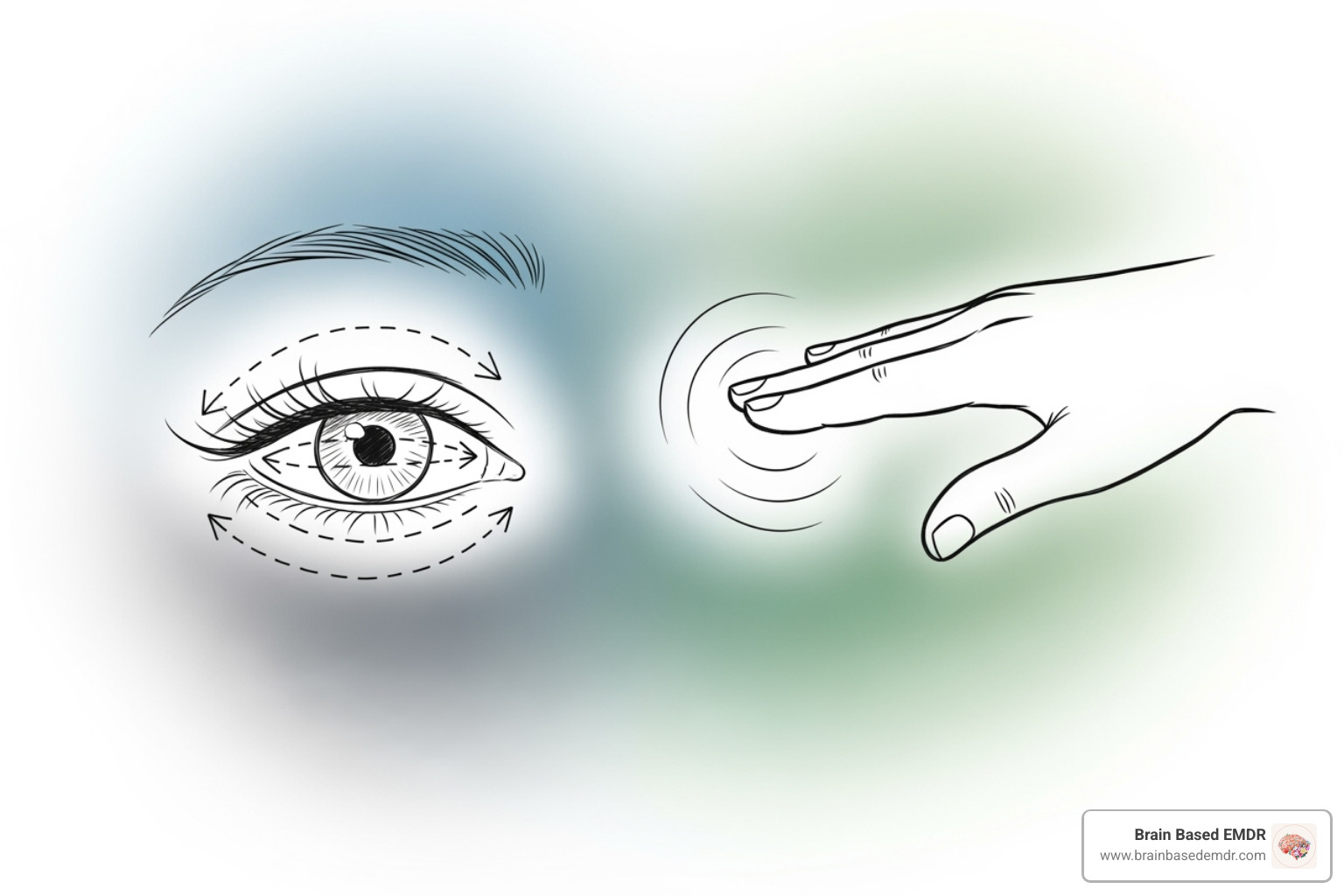Brain-Based EMDR Training: Transforming Therapeutic Practice Through Neuroscience

The landscape of trauma therapy continues to evolve, and mental health professionals increasingly recognize the need for evidence-based approaches that address trauma at its neurological roots. For therapists seeking to expand their clinical expertise and enhance client outcomes, mastering Eye Movement Desensitization and Reprocessing (EMDR) therapy has become essential. However, not all EMDR therapy training programs are created equal. The most effective training goes beyond basic protocol memorization to integrate cutting-edge neuroscience research with practical, hands-on application.
Brain Based EMDR represents a revolutionary approach to EMDR therapy training that combines traditional EMDR therapy methodology with modern neuroscience insights and resilience-focused techniques. This comprehensive training experience prepares mental health professionals to work confidently with complex trauma presentations while building lasting therapeutic skills that transform both practice and client outcomes.
Understanding EMDR Therapy: The Foundation of Trauma-Informed Care
Eye Movement Desensitization and Reprocessing (EMDR) therapy emerged in the late 1980s through the groundbreaking work of Dr. Francine Shapiro. What began as an accidental discovery during a walk in the park has evolved into one of the most researched and effective trauma therapies available today. EMDR therapy is based on the Adaptive Information Processing model, which suggests that psychological distress results from unprocessed traumatic memories that become "stuck" in the nervous system.
The therapy utilizes bilateral stimulation—typically through guided eye movements, though auditory and tactile methods are also effective—to help the brain reprocess traumatic memories. This reprocessing allows disturbing experiences to be integrated in a way that reduces their emotional charge and eliminates the intrusive symptoms commonly associated with trauma and PTSD.
EMDR therapy has received recognition from major health organizations worldwide, including the American Psychological Association, the World Health Organization, and the Department of Veterans Affairs. With over three decades of research supporting its efficacy, EMDR therapy has proven effective for treating not only PTSD but also anxiety disorders, depression, phobias, and various other mental health conditions.
For mental health professionals, learning EMDR therapy opens doors to working with trauma survivors in a way that is both efficient and gentle. Unlike traditional talk therapy approaches that may require years of treatment, EMDR therapy often produces significant results in fewer sessions, making it an invaluable tool for busy clinical practice settings.
The Brain-Based Approach: Where Neuroscience Meets Clinical Practice
Traditional EMDR therapy training often focuses primarily on protocol adherence and basic technique implementation. While these fundamentals are important, they represent only the beginning of what's possible when therapists truly understand the neuroscientific principles underlying EMDR therapy's effectiveness.
Brain Based EMDR training integrates the latest neuroscience research to help clinicians understand not just how to implement EMDR therapy, but why specific interventions work at the neurological level. This deeper understanding enables therapists to make informed clinical decisions, adapt techniques for individual clients, and troubleshoot challenging cases with confidence.
The brain-based approach recognizes that trauma affects multiple neural networks simultaneously. While traditional training might focus on memory processing alone, a comprehensive understanding incorporates how trauma impacts the autonomic nervous system, attachment patterns, emotional regulation, and somatic responses. This holistic perspective enables therapists to address trauma's complex presentation more effectively.
When therapists understand the neurobiological mechanisms behind EMDR therapy, they can better explain the process to clients, which often reduces anxiety and increases treatment engagement. Clients appreciate understanding why their therapist is asking them to follow finger movements or listen to bilateral sounds, and this transparency strengthens the therapeutic alliance.
Resilience-Focused EMDR Therapy: Building Strength Through Healing
One of the distinguishing features of Brain Based EMDR training is its emphasis on resilience-building throughout the therapeutic process. Rather than viewing clients solely through a trauma lens, this specialized approach recognizes and cultivates existing strengths while addressing areas of difficulty.
Resilience-focused EMDR therapy incorporates techniques that help clients identify and access internal resources before, during, and after trauma processing. This might include developing positive memory networks, strengthening self-soothing capabilities, and building confidence in one's ability to handle future challenges. The result is therapy that not only heals past wounds but also strengthens clients' capacity to thrive moving forward.
This approach particularly benefits clients with complex trauma histories, including those with developmental trauma, who may have limited positive resources to draw upon. By systematically building resilience alongside trauma processing, therapists can work more safely with challenging presentations while helping clients develop lasting coping skills that enhance their lives.
The resilience focus also extends to preventing therapist burnout. When clinicians can see their clients' growth and strength development, rather than focusing solely on pathology, their own sense of professional efficacy and satisfaction increases significantly.
EMDRIA-Approved Training: Meeting Professional Standards
Professional credibility and adherence to established standards are crucial considerations for mental health professionals seeking EMDR therapy training. Brain Based EMDR maintains full EMDRIA approved status from EMDRIA (EMDR International Association), ensuring that all training components meet the rigorous standards established by the international EMDR therapy community.
EMDRIA approved training provides several important benefits for participants. First, it ensures that the curriculum covers all essential components required for competent EMDR therapy practice, including theoretical foundations, practical application, and ethical considerations. Second, completion of EMDRIA approved training is required for therapists who wish to pursue EMDRIA certification, which enhances professional credibility and may be required by some employers or insurance panels.
The EMDRIA approved process involves careful review of training curriculum, instructor qualifications, and educational methods. This oversight provides participants with confidence that their training investment will be recognized by professional organizations, licensing boards, and colleagues in the field.
Additionally, EMDRIA approved training ensures access to ongoing professional development opportunities, consultation resources, and connection with the broader EMDR therapy community. These benefits extend far beyond the initial training period, supporting therapists throughout their EMDR therapy career development.
Comprehensive Curriculum: 40 Continuing Education Credits
Brain Based EMDR training provides 40 continuing education credits, meeting or exceeding the requirements for most professional licensing boards. This substantial credit allocation reflects the comprehensive nature of the training, which covers not only basic EMDR training protocols but also advanced techniques, complex case considerations, and specialized applications.
The curriculum is carefully structured to build skills progressively, beginning with foundational concepts and advancing through increasingly sophisticated interventions. Early modules focus on understanding trauma's impact on the brain and nervous system, establishing the theoretical framework that guides all subsequent learning.
Participants then learn the eight-phase EMDR therapy protocol, with extensive practice opportunities to develop technical proficiency. However, the training goes beyond basic training protocol implementation to explore modifications for different client populations, integration with other therapeutic approaches, and troubleshooting strategies for challenging cases requiring advanced treatment planning.
Advanced components include working with dissociative clients, addressing complex trauma presentations, incorporating somatic interventions, and integrating parts work approaches. The curriculum also covers case conceptualization strategies, treatment planning methodologies, and consultation techniques that enable graduates to work confidently with a broader range of client presentations.
The substantial continuing education credit allocation also means that participants can often satisfy a significant portion of their annual CE requirements through this single training experience, making it both educationally and economically efficient for busy clinicians.

Hands-On Learning: Experiential Training Methods
Effective EMDR therapy training requires more than passive learning through lectures or reading materials. EMDR therapy is fundamentally an experiential approach, and learning to implement it effectively requires extensive hands-on practice. Brain Based EMDR training emphasizes experiential learning methods that help participants develop both technical skills and clinical intuition.
The training program includes numerous opportunities for participants to practice EMDR therapy techniques with each other under expert supervision. This peer practice allows therapists to experience EMDR therapy from the client perspective, which deepens their understanding of the process and increases their empathy for clients undergoing treatment.
Supervised practicum sessions provide immediate feedback on technique implementation, helping participants refine their skills and build confidence. The practicum component allows trainees to apply their skills with real cases under supervision, while consultation provides ongoing support and feedback from experienced consultants. Instructors observe practicum sessions and offer real-time guidance, ensuring that participants develop proper technique habits from the beginning.
Case consultation components allow participants to discuss their actual client work (with appropriate confidentiality protections), receiving guidance on treatment planning, protocol selection, and challenging case management. This real-world application helps bridge the gap between training and independent practice implementation.
The experiential approach also includes personal processing opportunities for participants who choose to engage with their own material at their own pace. While not required, these experiences often deepen therapists' understanding of EMDR therapy's impact and increase their comfort with the intensity that can arise during treatment.
Small Class Sizes: Personalized Learning Experience
Unlike large-scale training programs that may include hundreds of participants, Brain Based EMDR maintains small class sizes that enable personalized attention and individualized learning support. This intimate learning environment provides several significant advantages for trainees.
Small classes allow instructors to adapt their teaching methods to the specific learning styles and needs of participants. Some therapists learn best through visual demonstration, others through hands-on practice, and still others through detailed theoretical explanation. With smaller groups, instructors can provide multiple learning modalities and adjust their approach based on participant feedback.
The personalized attention available in small classes also means that trainees can receive specific feedback on their technique development. Rather than generic comments applicable to large groups, participants receive detailed, individualized guidance that accelerates their skill development and prepares them for independent practice.
Small class sizes also foster peer learning opportunities. Trainees often learn as much from each other as from formal instruction, sharing clinical practice experiences, challenging cases, and practical implementation strategies. These peer connections frequently continue beyond the training period, creating ongoing professional support networks.
The intimate learning environment also enables trainees to ask questions freely without concern about appearing inexperienced in front of large groups. This psychological safety enhances learning and ensures that participants leave training with their questions answered and their confidence intact.

Expert Instruction: Learning from Libby Murdoch
The quality of EMDR therapy training depends significantly on instructor expertise and teaching ability. Brain Based EMDR training is led by Libby Murdoch, a recognized expert in trauma therapy and EMDR therapy instruction whose extensive experience benefits every training participant.
As a licensed clinical counselor and certified clinical trauma professional, Libby brings both advanced academic credentials and substantial real-world experience to her training programs. Her master's degree in counseling, master's degree in social work, and master's degree in psychology provide a comprehensive foundation for understanding trauma's complex presentations and treatment approaches.
Libby's specialization in complex trauma work means that training participants learn not only basic EMDR therapy techniques but also advanced interventions for challenging cases. Her expertise in working with dissociative clients, developmental trauma, and treatment-resistant presentations provides participants with skills that extend far beyond basic training protocol implementation.
As a solo practitioner running an independent practice, Libby understands the unique challenges facing individual therapists who must integrate EMDR therapy into existing practices. Her training approach addresses practical implementation considerations, business development strategies, and professional growth planning that larger institute settings might overlook.
Libby's commitment to ongoing professional development ensures that her training incorporates the latest research and clinical innovations. Participants benefit from cutting-edge knowledge that keeps them at the forefront of trauma therapy practice while receiving the consultation and support needed for successful implementation.
Online Training Accessibility: Serving Multiple Locations
Understanding that mental health professionals are located throughout the United States and may face geographic barriers to accessing quality training, Brain Based EMDR offers online training programs that serve therapists across multiple locations. This accessibility ensures that location does not limit professional development opportunities for clinicians seeking to integrate EMDR therapy into their practice.
Online training delivery has been refined to maintain the interactive, experiential elements that make EMDR therapy training effective. Through breakout room technologies, screen sharing capabilities, and careful attention to group dynamics, online participants receive training quality equivalent to in-person programs typically offered by traditional institute settings.
The online format actually provides some advantages for busy mental health professionals working in independent practice settings. Participants can access training from their home or office, eliminating travel time and associated costs. This accessibility makes training more feasible for therapists with busy schedules, family commitments, or geographic limitations.
Brain Based EMDR training is currently available to therapists in Raleigh, North Carolina; Greenville, South Carolina; Virginia Beach, Virginia; Hickory, North Carolina; Highland Heights, Kentucky (serving the Northern Kentucky University area); Las Vegas, Nevada; New York, New York; Los Angeles, California; Chicago, Illinois; and Dallas, Texas. This broad geographic coverage ensures that therapists throughout major metropolitan areas can access high-quality EMDR therapy training.
The online delivery format also enables trainees from different geographic regions to learn together, creating diverse peer learning opportunities and expanding professional networks beyond local boundaries while maintaining the consultation and support necessary for successful skill development.
Integration with Clinical Practice: Practical Implementation Strategies
Learning EMDR therapy techniques is only the beginning of successful implementation. Brain Based EMDR training includes substantial focus on practical integration strategies that help participants successfully incorporate EMDR therapy into their existing clinical practice settings.
Training components address common implementation challenges, such as scheduling longer sessions, managing client expectations, adapting office space for EMDR therapy work, and integrating EMDR therapy with other therapeutic modalities participants may already use in their practice.
Participants learn strategies for identifying appropriate EMDR therapy candidates, conducting thorough assessments, and developing comprehensive treatment planning that incorporates EMDR therapy alongside other interventions when appropriate. This comprehensive approach ensures that EMDR therapy becomes a natural part of participants' therapeutic toolkit rather than an isolated technique.
The training also addresses business considerations for therapists in independent practice, including fee structure considerations, insurance billing practices, and marketing ethical EMDR therapy services to potential clients. These practical elements help ensure that training investment translates into enhanced clinical practice effectiveness.
Follow-up consultation opportunities provide ongoing support as participants begin applying EMDR therapy in their practices. This continued connection helps address implementation challenges and ensures continued skill development beyond the initial training period through ongoing consultation with experienced consultants.

Complex Trauma Considerations: Advanced Clinical Applications
While basic EMDR training provides essential foundational skills, working effectively with complex trauma presentations requires additional expertise and specialized techniques. Brain Based EMDR training includes substantial focus on complex trauma considerations that prepare participants for challenging clinical presentations.
Complex trauma, often resulting from childhood abuse, neglect, or repeated adverse life experiences, affects clients differently than single-incident trauma. These clients may present with dissociative symptoms, emotional dysregulation, interpersonal difficulties, and somatic complaints that require modified treatment approaches and careful case conceptualization.
Training participants learn to recognize complex trauma presentations and adapt EMDR therapy techniques accordingly. This might include extended stabilization phases, modified processing approaches, integration of somatic interventions, and coordination with other treatment providers. The curriculum covers case conceptualization strategies specific to complex trauma and treatment planning modifications.
The training also addresses safety considerations when working with complex trauma, including recognizing dissociative episodes, managing flooding responses, and maintaining therapeutic boundaries with clients who may have attachment difficulties stemming from developmental trauma and adverse life experiences.
These advanced skills enable participants to work confidently with challenging cases that might otherwise require referral to specialized trauma centers. This expanded capability enhances both professional development and service accessibility for complex trauma survivors while ensuring appropriate consultation support.
Parts Work Integration: Addressing Internal Systems
Many trauma survivors, particularly those with complex trauma histories, benefit from therapeutic approaches that recognize internal parts or ego states. Brain Based EMDR training incorporates parts work concepts that enhance traditional EMDR therapy's effectiveness with these populations through specialized techniques and case conceptualization approaches.
Parts work recognizes that individuals may develop different internal "parts" or aspects of self in response to traumatic experiences and adverse life experiences. These parts may hold different memories, emotions, and beliefs about safety and relationships. Traditional therapy approaches that address the person as a unified whole may miss important dynamics between different parts, requiring modified treatment planning.
EMDR therapy can be modified to work specifically with different parts, helping each part process relevant traumatic material while maintaining overall system stability. This specialized approach requires specific skills and careful attention to safety considerations, along with ongoing consultation support.
Training participants learn to recognize when parts work approaches might be beneficial, how to safely engage different parts during EMDR therapy processing, and how to help parts integrate their healing in ways that strengthen overall functioning. This includes case conceptualization strategies specific to parts work and treatment planning modifications.
This advanced skill set enables participants to work effectively with dissociative clients, those with complex trauma histories, and others who may not respond fully to traditional EMDR therapy approaches while maintaining appropriate consultation relationships.
Somatic Interventions: Body-Based Trauma Processing
Trauma affects not only mental and emotional functioning but also the physical body. Many trauma survivors experience chronic pain, tension, hypervigilance, and other somatic symptoms that require attention during the healing process. Brain Based EMDR training incorporates somatic interventions that address trauma's physical manifestations through specialized techniques and treatment planning approaches.
Somatic approaches recognize that trauma memories are stored not only in cognitive and emotional networks but also in the body's nervous system. Complete trauma healing often requires addressing these somatic components alongside traditional psychological processing, requiring modified case conceptualization and treatment planning.
Training participants learn to recognize somatic trauma symptoms, incorporate body awareness into EMDR therapy processing, and use bilateral stimulation methods that engage the body's natural healing mechanisms. These skills enhance treatment effectiveness while addressing clients' physical symptoms and support healing attachment wounds that may manifest somatically.
The somatic focus also helps participants understand how trauma affects nervous system regulation, enabling them to help clients develop improved self-regulation skills that support long-term recovery. This includes specific consultation on applying these techniques safely and effectively.
These body-based interventions are particularly valuable for clients who struggle with traditional talk therapy approaches or who present with significant physical symptoms related to their trauma history and adverse life experiences.

Professional Development and Career Enhancement
Completing comprehensive EMDR therapy training represents a significant professional development milestone that can enhance career opportunities in multiple ways. Mental health professionals who offer EMDR therapy services often find increased referral opportunities, enhanced job marketability, and greater professional satisfaction in their clinical practice.
EMDR therapy skills are increasingly in demand as awareness of trauma's prevalence grows and clients specifically seek trauma-informed treatment approaches. Many employment opportunities now list EMDR therapy training as preferred or required qualifications, making this skill set valuable for career advancement whether in independent practice or institutional settings.
Solo practitioners often find that adding EMDR therapy services enables them to work with client populations they might previously have referred elsewhere, expanding their practice scope and increasing revenue potential. The efficiency of EMDR therapy treatment also means that practitioners can often help more clients in less time, improving both client outcomes and practice productivity.
The specialized nature of EMDR therapy training also positions practitioners as trauma specialists in their communities, often leading to consultation opportunities, speaking engagements, and professional recognition that enhance overall career development and establish them as valuable consultants to other clinicians.
Continuing Education and Professional Growth
Completing initial EMDR therapy training marks the beginning rather than the end of professional development in this specialization. Brain Based EMDR supports ongoing learning through advanced training opportunities, consultation groups, and professional development resources that help clinicians continue growing throughout their careers.
Advanced training modules address specialized applications such as working with specific populations (children, couples, first responders), integrating EMDR therapy with other therapeutic modalities, and developing expertise in complex trauma presentations. These ongoing learning opportunities help practitioners continue expanding their skills and case conceptualization abilities throughout their careers.
Consultation opportunities provide ongoing support for challenging cases, technique refinement, and professional development planning. These connections often evolve into long-term professional relationships that support career growth and practice development while ensuring continued competency in applying EMDR therapy effectively.
The broader EMDR therapy community offers numerous trainings offered through various institute settings, professional networking opportunities, and contribution to the field's continued development. Many practitioners find that becoming part of this community enhances their professional satisfaction and provides ongoing learning opportunities through consultation and peer support.
Investment in Excellence: Choosing Quality Training
Mental health professionals face numerous options when considering EMDR therapy training, and the decision represents a significant investment of time, money, and professional energy. Choosing quality training that provides comprehensive skills, ongoing consultation support, and professional credibility is essential for maximizing this investment.
Brain Based EMDR training represents a commitment to excellence that benefits participants throughout their careers. The comprehensive curriculum, expert instruction, personalized attention, and ongoing consultation combine to create a training experience that transforms both professional capabilities and client outcomes.
The integration of neuroscience research, resilience-focused approaches, and advanced clinical techniques provides participants with cutting-edge skills that position them at the forefront of trauma therapy practice. This advanced training enables practitioners to work confidently with challenging cases while achieving superior client outcomes through effective case conceptualization and treatment planning.
For mental health professionals serious about developing trauma specialization, investing in comprehensive, high-quality training provides the foundation for a rewarding and successful career enhancement. The skills, knowledge, and professional connections gained through excellent training continue providing value throughout one's professional career, supported by ongoing consultation and advanced learning opportunities.
The practicum component ensures that trainees gain hands-on experience with real cases under supervision, while consultation requirements provide ongoing support for skill development and case management. This comprehensive approach to skill development helps ensure that graduates can confidently integrate EMDR therapy into their clinical practice.
Whether working in independent practice, group settings, or institutional environments, therapists who complete comprehensive EMDR therapy training find themselves better equipped to help clients heal from trauma while advancing their own professional development through specialized expertise and consultation relationships.
If you're ready to transform your clinical practice through comprehensive EMDR therapy training that integrates cutting-edge neuroscience with practical application, Brain Based EMDR offers the expertise, consultation support, and professional development you need. Contact us today to learn more about upcoming training opportunities and discover how this investment in your professional development can enhance both your practice and your clients' healing journey.
